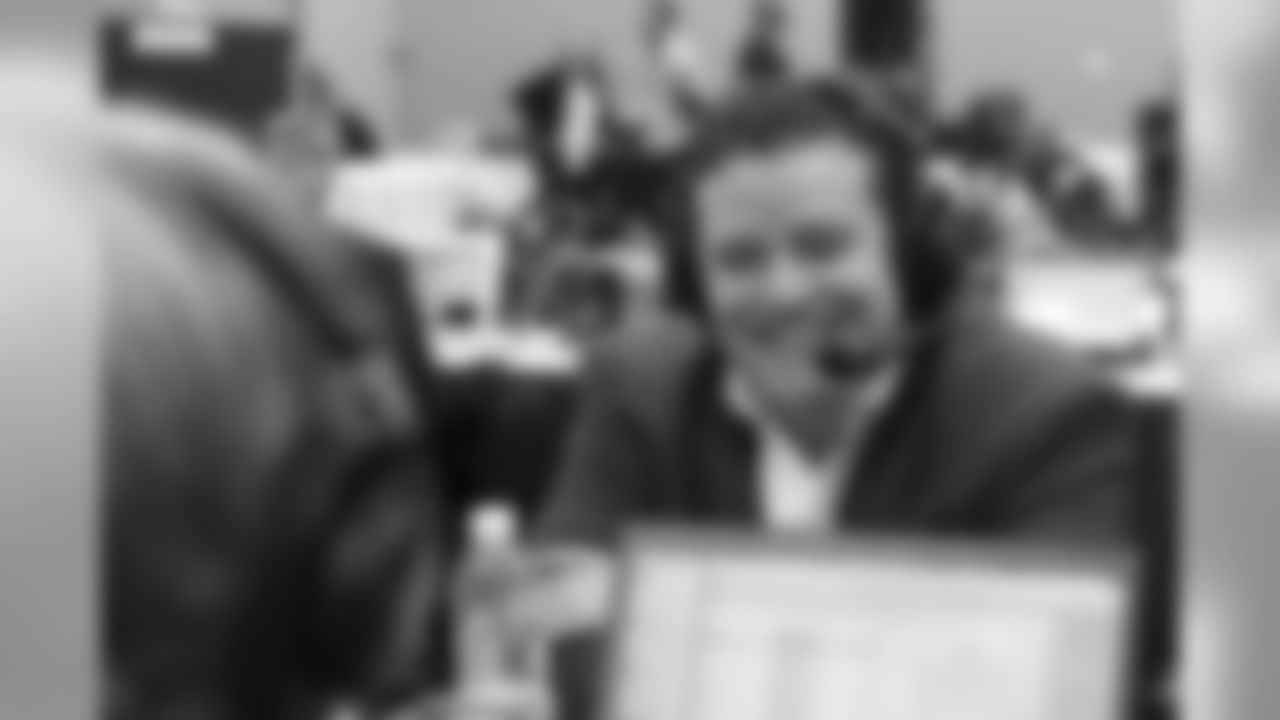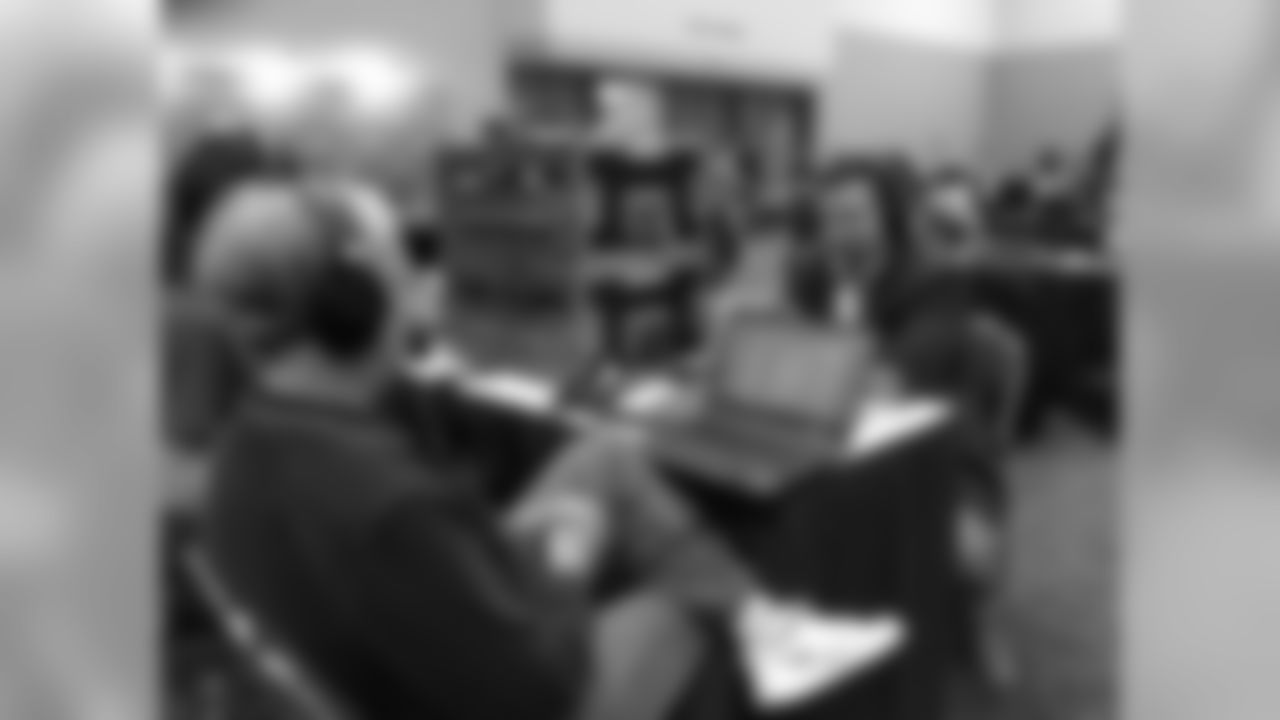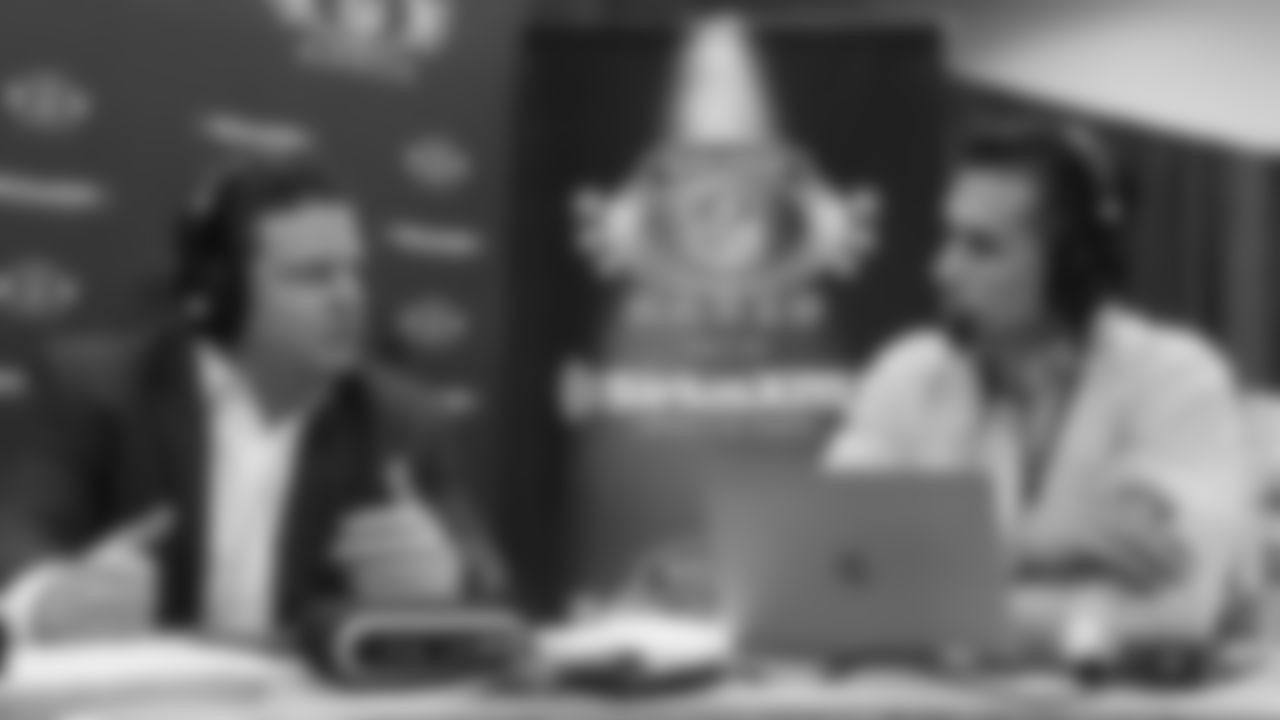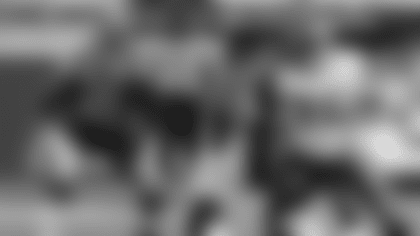INDIANAPOLIS—The Seahawks recently wrapped up what Seahawks general manager John Schneider described as 15 days of "phenomenal meetings" to prepare for this week's NFL Scouting Combine and next month's draft. And thanks to the work done by co-directors of player personnel Scott Fitterer and Trent Kirchner, director of college scouting Matt Berry, the rest of team's scouting department and the video department, Schneider feels like the Seahawks come into this year's combine well prepared for this phase of draft evaluation, which is taking place a week later than it has in recent years.
"I feel like this combine in general, having more time to get prepared, we're ready to roll," Schneider said.
Schneider also met with the media on Wednesday, covering a number of topics, including some injury updates. In addition to those health updates, here are seven things we learned from Schneider's press conference:
1. Talent evaluation is a constant process that includes "learning from your mistakes."
This will be Seattle's eighth draft under Schneider and head coach Pete Carroll, but just because this current Seahawks regime has been at it for a while, that doesn't mean they feel like they have things figured out, or have stopped working hard to find ways to be better at this draft process.
"We are going to work, just keep going, keep going and keep going, and not think that we have all the answers," Schneider said. "Just being able to say, 'Look, we are at a place where it's Player C, and not Player A that we thought all this time.' So, that could be three weeks from now, that could be five weeks from now. It's just a constant process. We do not shut our doors on our draft board until like the night before."
Asked about the instincts it takes to do the job, Schneider said, "I think a hunch, and just learning from your mistakes. Learning what's gone well, I think, is a big one. I think where I've made mistakes, personally, is when I compare individuals to other players, and they are not the same people. They don't have the same—they are not the same people, at their core. Or you push with 'We're not going to draft for need.' Well, in this day, you kind of have to. I would say just praying on it, work ethic, just learning from your mistakes, and just trying to accentuate the positives that you learn along the way."
When it comes to learning who people are, "at their core," as Schneider puts it, this week is an important time for teams as they meet with prospects and watch how they work.
"There's a lot of things you can see and evaluate," Schneider said. "How do they handle themselves with their leadership groups? We have scouts and personnel guys who lead these groups, and how do they handle themselves within those groups? How do they conduct themselves? Do they conduct themselves like a pro? Will they compete? Will they go out there and have a pec injury from about two weeks ago, but they're going to push through it—being smart about it, don't get me wrong—but are they going to bench and compete in everything? You can see it. You can tell the guys, when you interview them in the room, and then when you get out there and watch them perform."
2. The Seahawks are aggressive in free agency, even if it doesn't always result in deals, and will continue to be this offseason.
The Seahawks haven't been known for making huge splashes in free agency under Schneider—though they've made some very important additions, including defensive ends Michael Bennett and Cliff Avril—but just because they aren't always making headlines, that doesn't mean they aren't looking into those big-name free agents.
"Actually, we are aggressive in free agency; we just don't do a lot of deals lately," Schneider said. "We try to pride ourselves on being involved in a lot of deals, and then deciding what our threshold is for those deals. Whether that's our own players, and then what free agency looks like in terms of acquisition."
The Seahawks head into the new league year with very few of their own players headed towards unrestricted free agency, but while that helps them assess their roster as they consider potential moves, having core players locked up for 2017 doesn't mean they don't have work to do.
"It really helps… but it never stops," Schneider said. "It's just like this constant jigsaw puzzle. You really try to get better every single day. So once we do get a deal done with somebody, we are just moving on to the next thing… So it's not as much as a checklist, if you will. Like I said, you have your Plan A, but there are always things that pop up. All of a sudden you are on Plan E. So it definitely helps. But it's always about what's next. That's my job, and our job as a personnel staff, is to be strategizing about what's coming, what's down the road for us?"
3. Offensive line cohesion is key, but the Seahawks also would like to "add some experience" to that group.
The Seahawks have a chance to return all five starting offensive linemen from last season, and at a position group where continuity and cohesion are vital, that group could take a big step forward in 2017 if no changes were made. That being said, however, the Seahawks would also like to add more experience to a group that was very young in 2016.
"I think we'd like to add some experience at that position," Schneider said, pointing to the preseason release of veteran guard Jahri Evans was something they might have done differently in hindsight.
"I'd be lying to you if I said different," Schneider said. "I think his leadership would have been outstanding for us. I think we got in a position where we probably got a little bit too young. With us, that offensive line thing is all about acquisition, and the mix in the room between veteran leadership and talent, but that cohesion that goes along with it. Some of the best offensive lines I've been around, and the best teams, quite frankly, are the ones that have the core group of offensive linemen. We have to have that mentality. We need to bring those young guys along like we did last year. We brought a bunch of rookies, second-year guys, we moved (Justin) Britt to center, that sort of thing. But they have to have that cohesion… That group in particular is a group that played with that cohesion and really had that level of confidence in each other."
While the Seahawks battled some inconsistencies in their line play last year, they were hardly alone in having issues with that position group. Coaches and general managers have noted for several years that linemen are coming into the NFL less prepared than in the past, both because of the changes in the style of offense being played, and also because more of the top big men tend to gravitate to the defensive line.
"When you go to colleges and you talk to the coaches, they struggle to find offensive linemen," Schneider said. "Everyone wants to play quarterback and running back and defensive line. It's just how the football culture is right now. The majority of guys aren't like, 'I'm going to be the best offensive lineman in high-school football,' you know what I mean? They want to sack the quarterback. Look at us with George Fant last year. God bless him, but holy cow, man—the guy was playing basketball, and now he's out there playing against Robert Quinn. So, good luck.
"There's just a dearth at the position. There just has been for a number of years now. You just have to be really careful to figure out those guys that have the mental aptitude, first, to come in and learn everything. I think you saw it throughout the season with our younger guys. There's a lot of stuff happening in there, and they have to figure it out. They have to be able to communicate, they just have to jell. And so being able to identify those players that can come in and work within that room—and we feel like we are blessed. We feel like we have one of if not the best offensive line coach in the league… Tom (Cable), we rely on him big time for that. He's the guy that's going to be spending 14 hours a day with these guys. So, yeah, we rely on him. Big time."
4. Spread offenses in youth, high school and college football continue to change the game at the NFL level.
As Schneider and other GMs and coaches have noted, the way the game has changed in college, and even the high-school and youth levels, has made it harder to find NFL-ready offensive linemen. While rookie quarterbacks and receivers in many cases are better prepared than ever playing come up in pass-happy offenses, offensive linemen tend to need more time to develop. It's a change in the game that NFL teams have seen coming for a while, and one they know will continue to evolve going forward.
"Sometimes you think about, 'OK, where are we going?'" Schneider said. "What is the NFL going to look like in, you know, 10, 15 years when my son's playing sixth-grade football and he's running the spread, and they are looking at the sidelines and reading numbers and cards and stuff. Are we going to call plays in the huddle anymore? That's a really good question. It's a very hard one to answer. I think from a perimeter standpoint we are probably going to see a lot of the same things. But from an interior standpoint, I think things may change a little bit. I can't tell you how, but if we are going to keep going in this direction, I mean, this is the talent pool that we are dealing with. I mean, these guys, they are coming in the league like—there aren't a lot of guys that are coming into this league that know who Larry Allen is, Nate Newton… So that's kind of how we are evolving a little bit. You are seeing a quicker, maybe a little bit lighter type of dude."
5. The Seahawks hope to avoid injury setbacks at running back this year.
The Seahawks really liked the talent they had at running back in 2016, but they didn't get the production they hoped for out of their running game, in large part because of injuries to Thomas Rawls and C.J. Prosise, as well as quarterback Russell Wilson. The Seahawks don't yet know exactly what that position group will look like in 2017 or how the workload will be divided, but they do know they need better health than they had last season.
"We lost Thomas last year, and that did set us back," Schneider said. "And then our quarterback was injured, so that took a number of our rushing yards away. C.J. needs to prove that he can be a reliable guy, physically, and he's doing a great job this offseason. But in terms of splitting that up, it's way too early to be talking about that."
6. Blair Walsh's signing doesn't necessarily mean the Seahawks are moving on from Steven Hauschka.
Steven Hauschka is set to become a free agent when the new league year begins later this month, and the Seahawks signed former Vikings kicker earlier this offseason, but while those two things are related, they don't definitely mean that Hauschka won't be re-signed. The Seahawks have to have a plan in place if they don't re-sign Hauschka—hence signing Walsh when he was available—but they also want competition in camp, whether that comes in the form of bringing Hauschka back or signing someone else.
"No, it doesn't mean that," Schneider said if Walsh's signing meant the Seahawks were moving on from Hauschka. "I think it's just really, quite honestly, it's an aspect of unrestricted free agency. You have all your boxes to check. I know it seems kind of cold. We take it personally, because we have such a personal relationship with these guys. Steven's been phenomenal for us, has done a lot of great things for the Seahawks. We had an opportunity to kind of check a box in free agency with Blair. We'll be looking at somebody else to come in and compete as well. It could be Steven, I'm not sure. But with Blair, he was a guy that we call reserve/future signings. He was still out there. A number of teams wanted to sign him. We brought him in, worked him out and got a deal done. It's kind like checking that box and, OK, take a deep breath and we can move on to what's next. You go into free agency you have Plan A—but there are 25 other letters in the alphabet. We've got like a whole slew of things going on."
7. Jimmy Graham isn't going anywhere.
Jimmy Graham set franchise records for tight end receptions and receiving yards in 2016 and earned Pro Bowl honors, but despite that level of production, and despite being under contract in 2017, there has been some media and fan speculation that Graham might not be back in Seattle in 2017.
Schneider put that notion to rest rather definitively on Wednesday, saying, "There's no reason to think he's not going to be a part of our team next year."
RELATED
Photos of Seahawks general manager John Schneider meeting with the media on Wednesday, March 1 at the 2017 NFL Combine in Indianapolis, Indiana.







Seattle Seahawks general manager John Schneider speaks with the media at the NFL football scouting combine, Wednesday, March 1, 2017 in Indianapolis. (AJ Mast via AP Images)


Seattle Seahawks general manager John Schneider speaks with the media at the NFL football scouting combine, Wednesday, March 1, 2017 in Indianapolis. (AJ Mast via AP Images)



Seattle Seahawks general manager John Schneider speaks with the media at the NFL football scouting combine, Wednesday, March 1, 2017 in Indianapolis. (AJ Mast via AP Images)


Seattle Seahawks general manager John Schneider speaks during a press conference at the NFL Combine in Indianapolis, Wednesday, March 1, 2017. (AP Photo/Michael Conroy)








